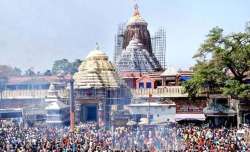Jagannath temple case: SC asks amicus to visit shrine to assess ground reality
During the hearing on Tuesday, the amicus said one of the major issues at the temple was the lack of proper crowd management and absence of queue system for the devotees.

The Supreme Court on Tuesday asked senior advocate Ranjit Kumar, who is assisting it as an amicus curiae in a matter related to administration of Jagannath temple in Puri, to visit the shrine to assess the ground reality there.
A bench headed by Justice AK Sikri said this after the counsel appearing for Odisha argued that the amicus should visit the temple and himself see the situation there.
When the bench asked Kumar about it, he said he would visit the temple on February 22 and 23 and apprise the court.
The top court is dealing with a plea which has highlighted the difficulties faced by the devotees at Jagannath temple and their alleged harassment or exploitation by the 'sevaks' of the temple.
During the hearing on Tuesday, Kumar said one of the major issues at the temple was the lack of proper crowd management and absence of queue system for the devotees.
To this, the state counsel said that as the architecture of the shrine was different it was not easy to have a "typical queue system" for the devotees there.
Referring to the architecture of the sanctum sanctorum there, the counsel said, "The amicus can go there and see the situation. The problem which the state is facing today cannot be visible unless the amicus goes there and sees it himself. We are not opposing the queue system."
After Kumar said he would go to the shrine, the bench asked the state to make all arrangements for his visit there.
The bench also said that Puri's District Judge, who had earlier given a report to the apex court about administration of the shrine, and administrator of the temple to assist the amicus.
The bench posted the matter for further hearing on February 27.
Kumar referred to the interim report filed last year by the district judge in the top court which had raised the issue of alleged harassment of devotees by the 'sevaks' (staffs) of the temple.
"Despite all the recommendations, either the state or the administrator are not doing anything or they do not want to do this due to which visitors going there are harassed," the amicus told the bench.
When one of the advocates appearing in the matter raised the issue of 'sevaks', Justice Sikri observed, "We are telling you with our own experience that there is exploitation (of devotees)."
On January 9, the apex court had appointed Kumar as an amicus curiae to assist it in the case.
The apex court had on November 30 last year accepted the request of senior advocate Gopal Subramanium to relieve him as amicus curiae in the matter.
Nine policemen were injured in the violence at Puri in October last year during a 12-hour bandh called by a socio-cultural organisation protesting the introduction of a queue system for devotees visiting the temple, police had said.
The court had earlier said that no policeman should enter Jagannath temple "with weapons and shoes" after it was alleged before it that during the October 3 last year violence at the shrine, cops had entered there with boots and guns.
The Odisha government's counsel had termed the allegations as "absolutely false" and said no policeman had entered the temple as the incident had taken place at office of Shree Jagannath temple administration which is situated around 500 metres from the main temple.
In July last year, the top court had directed the Jagannath temple management to consider allowing every visitor, irrespective of faith, to offer prayers to the deity.
However, it had said that it would be subject to regulatory measures regarding dress code and giving an appropriate declaration.
It had directed the Centre to constitute a committee to look into the issues raised by the district judge of Puri regarding alleged exploitation of devotees, abolishment of hereditary Sevaks and appointment of Sevaks in the temple.